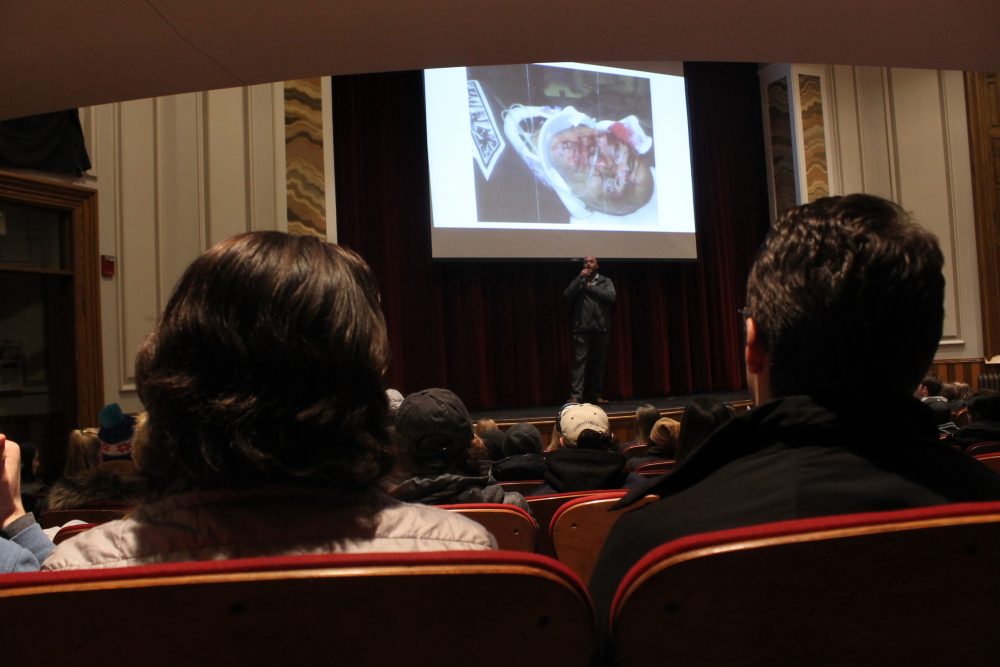
Alexander Landau speaks in Old Main on the CU Campus. Feb. 20, 2018 (Kristin Oh/CU Independent)
In 2009, Denver’s projected police misconduct rate was the 13th highest of all U.S. cities, according to Cato Institute analysis. Denver-based activist Alexander Landau, then a 19-year-old student, experienced this violence firsthand.
Landau began his Tuesday talk in Old Main with an emotional recounting of the night he was beaten by police officers. In 2009, Landau was pulled over for an alleged “illegal left turn.” According to Justice Department statistics, black drivers are roughly 31 percent more likely to be pulled over than white drivers. Despite Landau’s respectful compliance, three officers beat him unconscious.
Landau is African-American and was raised by white adoptive parents in Colorado Springs. Despite his parents’ attempts to create a “black identity” within their household, Landau said he and his adopted sister “were the diversity” in his community. As a result, he said they didn’t learn the inherent complex realities faced by people of color in today’s society.
The Landau family always discussed racist encounters, such as when a young Landau was told by another child that “sometimes not all white kids want to play with black kids,” but only on an emotional level. The conversation was never placed within a broader “systemic” context. Landau explained that his family never talked about how law enforcement might interact with him and his sister as members of the black community.
In a pre-event interview, Landau explained the history of policing, which he said began as a tool for segregation and to aid in the oversight of plantations. After the abolition of slavery, members of law enforcement were trained to uphold racist Jim Crow laws. Racial profiling off of misguided stereotypes is law enforcement’s way of continuing to oppress minority communities.
“Racism can’t exist without a power structure,” Landau said.
This power structure, Landau claimed, is the culture of oppression that is built into the system of American law enforcement. By supporting racist laws, officers enforce white supremacy.
Landau explained that this system persists in modern society because of the level of authority that police officers have. He claims it offers them “a level of impunity to the criminal justice system.”
The police officers who attacked Landau were never held responsible for their criminal actions. In Denver, Fraternal Order of Police Lodge no. 27 permits officers to appeal discipline from their superiors an unlimited number of times. This allowance, Landau states, serves as proof that the Police Officer Standards and Training Board is not doing its job.
In order to “shift the narrative and culture of policing,” Landau explained, the system of policing has to change. Law enforcement needs to relinquish some of its authority.
Andrew Patra, a freshman advertising student, said that as a racial minority, Landau’s speech impacted him on a personal level. After hearing Landau’s firsthand account of police brutality, Patra said it caused him to be more aware of how he carries himself.
“Being a minority, it kind of opens your eyes to what you should be looking out for and how to navigate interactions with police,” Patra said.
Landau urged departments to share internal affairs information, record and analyze the number of complaints directed towards individual officers, and put more effort into firing corrupt officers.
Landau said the general system of policing needs to shift its focus from protecting officers to protecting community members. He urged individuals to listen to the experiences of community members with unjust officers. He said that the best way for white civilians to encourage reform is to believe and support the stories of others.
“Narrative is a tool for education,” Landau said.
Contact CU Independent News Staff Writer Georgia Knoles at georgia.knoles@colorado.edu.
